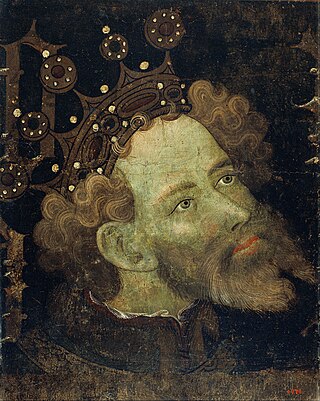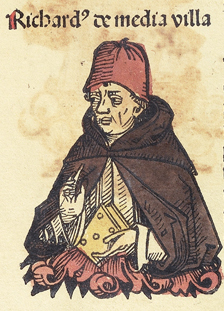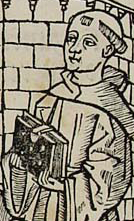
Alexander of Hales, also called Doctor Irrefragibilis and Theologorum Monarcha, was a Franciscan friar, theologian and philosopher important in the development of scholasticism.

William of Ockham or Occam was an English Franciscan friar, scholastic philosopher, apologist, and Catholic theologian, who is believed to have been born in Ockham, a small village in Surrey. He is considered to be one of the major figures of medieval thought and was at the centre of the major intellectual and political controversies of the 14th century. He is commonly known for Occam's razor, the methodological principle that bears his name, and also produced significant works on logic, physics and theology. William is remembered in the Church of England with a commemoration on the 10th of April.

Scholasticism was a medieval school of philosophy that employed a critical organic method of philosophical analysis predicated upon the Aristotelian 10 Categories. Christian scholasticism emerged within the monastic schools that translated scholastic Judeo-Islamic philosophies, and thereby "rediscovered" the collected works of Aristotle. Endeavoring to harmonize his metaphysics and its account of a prime mover with the Latin Catholic dogmatic trinitarian theology, these monastic schools became the basis of the earliest European medieval universities, contributing to the development of modern science; scholasticism dominated education in Europe from about 1100 to 1700. The rise of scholasticism was closely associated with these schools that flourished in Italy, France, Portugal, Spain and England.

Peter IV, called the Ceremonious, was from 1336 until his death the king of Aragon, Sardinia-Corsica, and Valencia, and count of Barcelona. In 1344, he deposed James III of Majorca and made himself King of Majorca.

John Peckham was a Franciscan friar and Archbishop of Canterbury in the years 1279–1292.
Peter John Olivi, also Pierre de Jean Olivi or Petrus Joannis Olivi, was a French Franciscan theologian and philosopher who, although he died professing the faith of the Roman Catholic Church, remained a controversial figure in the arguments surrounding poverty at the beginning of the 14th century. In large part, this was due to his view that the Franciscan vow of poverty also entailed usus pauper. While contemporary Franciscans generally agreed that usus pauper was important to the Franciscan way of life, they disagreed that it was part of their vow of poverty. His support of the rigorous view of ecclesiastical poverty played a part in the ideology of the groups coming to be known as the Spiritual Franciscans or Fraticelli.
Godfrey of Fontaines, in Latin Godefridus de Fontibus, was a scholastic philosopher and theologian, designated by the title Doctor Venerandus. He made contributions to a diverse range of subjects ranging from moral philosophy to epistemology. However, he is best known today for his work on metaphysics.
John Baconthorpe, OCarm was a learned English Carmelite friar and scholastic philosopher.

Richard of Middleton was a member of the Franciscan Order, a theologian, and scholastic philosopher.
Francis of Meyronnes was a French scholastic philosopher. He was a distinguished pupil of Duns Scotus, whose teaching (Scotism) he usually followed.

Petrus Aureoli, often anglicized Peter Auriol, was a scholastic philosopher and theologian.

Francesc Eiximenis was a Franciscan Catalan writer who lived in the 14th-century Crown of Aragon. He was possibly one of the more successful medieval Catalan writers since his works were widely read, copied, published and translated. Therefore, it can be said that both in the literary and in the political sphere he had a lot of influence. Among his readers were numbered important people of his time, such as the kings of the Crown of Aragon Peter IV, John I and Martin I, the queen Maria de Luna, and the Pope of Avignon Benedict XIII.
Hervaeus Natalis, also known as de Nédellec, was a Dominican theologian, the 14th Master of the Dominicans, and the author of a number of works on philosophy and theology. His many writings include the Summa Totius Logicae, an opusculum once attributed to Thomas Aquinas.
Henry (of) Harclay was an English medieval philosopher and university chancellor.
Geraldus Odonis, Guiral Ot in Occitan, was a French theologian and Minister General of the Franciscan Order.
The principle of individuation is a criterion that individuates or numerically distinguishes the members of the kind for which it is given, that is by which we can supposedly determine, regarding any kind of thing, when we have more than one of them or not. It is also known as a 'criterion of identity' or 'indiscernibility principle'. The history of the consideration of such a principle begins with Aristotle. It was much discussed by the medieval philosopher Duns Scotus with his "haecceity" and later, during Renaissance, by Francisco Suárez (1548–1617), Bonaventure Baron (1610–1696) and Leibniz (1646–1716).

John Duns Scotus was a Scottish Catholic priest and Franciscan friar, university professor, philosopher and theologian. He is one of the four most important Christian philosopher-theologians of Western Europe in the High Middle Ages, together with Thomas Aquinas, Bonaventure and William of Ockham.

Pasteur de Sarrats was a French Franciscan friar, bishop and Cardinal. He was born in the village of Aubenas in the Vivarais, or he took his monastic vows in the monastery of Aubenas. Pasteur may have had a brother. A bull of Benedict XII, dated 13 April 1337, grants the parish church of S. Martin de Valle Gorgia in the diocese of Viviers to Pierre de Serraescuderio, Canon of Viviers since 1333, who held a parish of S. Pierre de Melon in the diocese of Uzès. Pasteur died in Avignon in 1356.
Guerric of Saint-Quentin was a Dominican friar, theologian and teacher at the University of Paris from 1233/5 until 1242. He wrote several works on biblical exegesis and theology. Along with Alexander of Hales, he is often credited with inventing the genre of the quodlibeta.
Petrus Thomae, known in Catalan as Pere Tomàs or anglicized as Peter Thomae, was a Catalan Franciscan philosopher and theologian. He was an eminent Scotist who died while in prison on charges of sorcery.